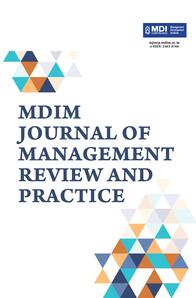
1Management Development Institute Murshidabad, Murshidabad, West Bengal, India
Creative Commons Non Commercial CC BY-NC: This article is distributed under the terms of the Creative Commons Attribution-NonCommercial 4.0 License (http://www.creativecommons.org/licenses/by-nc/4.0/) which permits non-Commercial use, reproduction and distribution of the work without further permission provided the original work is attributed.
The prosperity that gives greater credit to society, in terms of quality of life, is that which is based on knowledge. Information technologies (IT), particularly those applied in the field of education, play a crucial role in shaping innovative, creative and competitive actors in the contemporary global world. ‘The utilization of information and data, as well as the knowledge, skills, and talents present within communities, as well as their views, commitments, and motives for making wise judgments, are among the fundamental components of knowledge management’ (Stevenson-Perez, 2009, U.S. Patent Application No. 11/904,120). It has been argued by several eminent social scientists on this subject that organizational knowledge ought to be viewed as a strategic advantage. To solve issues and take advantage of opportunities, communities are being pushed to create effective and efficient means of assembling, identifying, capturing and distributing their collective knowledge and expertise. This understanding of the significance of doing so is developing. People all around the world are interested in putting knowledge management practices and technology into practice, and many of them have made knowledge management an essential component of their overall growth plans. Management of knowledge is becoming more and more crucial to the growth of the world economy. Organizations should not neglect knowledge management and developing technologies if they want to stay relevant in the current world.
society, knowledge, information technology
Davidson, C. N., & Goldberg, D. T. (2009). The future of learning institutions in a digital age. MIT Press. https://doi.org/10.7551/mitpress/8517.001.0001
Ian, B. (2008). The knowledge economy: How knowledge is reshaping the economic life of nations. Work Foundation. https://www.researchgate.net/publication/263518303_The_Knowledge_Economy_How_Knowledge_is_Reshaping_the_Economic_Life_of_Nations
Kërçi, T., Tzounas, G., & Milano, F. (2022). A dynamic behavioral model of the long-term development of solar photovoltaic generation driven by feed-in tariffs. Energy, 256, 124506. https://doi.org/10.1016/j.energy.2022.124506
Morell, L. (n.d.). Engineering education in the 21st century: Roles, opportunities and challenges. https://luenymorell.files.wordpress.com/2010/12/morell-eng-edu-in-21st-cent-roles-opport-and-challenges.pdf
Sila, N. A. (2022). The significant impact of information technology in business and globalization. Journal of Positive School Psychology, 6(2), 4690–4695. https://journalppw.com/index.php/jpsp/article/view/2923
Stevenson-Perez, H. C. (2009 April 2). Knowledge management portal for rapid learning and assessment of science. U.S. Patent Application No. 11/904,120. https://patents.google.com/patent/US20090089238